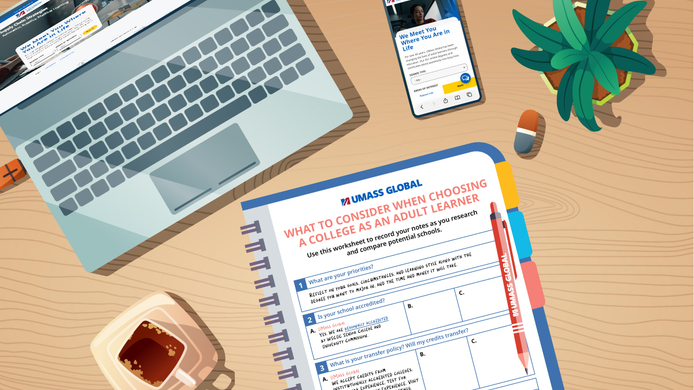UMass Global offers a wide variety of degree programs for adult learners. Explore your options and find a degree that fits you.

Returning to higher education as an adult is a purposeful move that can shape your career, life, and future opportunities. For busy professionals, parents, and military service members, the path to a degree comes with unique considerations around balancing family, work, and school demands. Choosing the right college as an adult learner isn’t just about location or program offerings; it’s about finding a fit that respects the complexities of adult life and helps set you up for lasting success. Here are some helpful tips to help you get off on the right foot to find the right college as an adult learner:
Start With Your Priorities
Before you begin comparing institutions, reflect on your goals, circumstances, and learning style. What degree will advance your career? How much time and money are you able to invest? Taking this time to evaluate your personal priorities will empower you to focus your search and choose a college that genuinely supports your ambitions, lifestyle, and long-term success as an adult learner.
Accreditation Matters
Check that any potential college is accredited by a recognized agency, such as the WASC Senior College and University Commission (WSCUC). Accreditation isn’t just a label, it can also affect your ability to transfer credits, qualify for financial aid, and be recognized by employers. UMass Global maintains rigorous regional accreditation, including WSCUC, supporting quality education and transferability of credits.
Transfer Policies & Prior Learning
Many adults bring previous college credits or professional experience that may count toward a degree. Evaluate whether a school has flexible transfer policies and recognizes prior learning, military experience, or current certifications for credit. UMass Global has a generous transfer policy and assists with transcript evaluation, helping students streamline their journey to graduation.
Learning Formats for Busy Lifestyles
Course flexibility is vital for adult students. Options can include fully online programs, evening classes, and competency-based pathways such as UMass Global’s MyPath, which lets learners demonstrate mastery through prior experience and progress at their own pace. The right format should fit your schedule, optimize time, and keep you engaged, whether on campus or learning remotely. Find out which learning format is right for you with our quiz, “What Type of Online Learner Are You?”.
Understanding Student Demographics
Connection with peers matters. Adult learners often want to study alongside fellow professionals, not just recent high school graduates. At UMass Global, about 95 percent of students work while completing their degree, and more than half balance education and parenting. We understand that having support as a nontraditional student is invaluable, fostering success and encouraging completion of the program.
Supportive Services and Career Readiness
Look beyond academics to resources available for career development and student support. Colleges with robust career centers, technology support, and tutoring (available online and/or on-demand) can make a substantial difference. UMass Global prioritizes individualized assistance and career-focused experiences, oftentimes including internships and field placements built into degree programs.
Financial Outcomes and Student Success
Ask about student loan default rates and graduation rates. These metrics reflect whether graduates are finding jobs and staying on track. Low default rates indicate that alumni are employed, have put their degrees to work, and are able to pay back their student loans. High default rates often indicate the opposite, which can result in some serious penalties for an institution, such as losing access to federal loans for students. UMass Global’s student loan default rate is 0% percent, and 90% of our alumni felt strongly or very strongly that UMass Global supported their specific needs as an adult learner.
Military Friendliness
If you’re a current or former service member, ensure colleges offer dedicated Military and Veterans Services and understand your education benefits. Look into whether it has earned an official Military Friendly® designation. This survey represents the longest-running, most comprehensive evaluation of higher education institutions’ ability to adequately serve military and veteran students. For the best possible experience, consider schools that exceed the Military Friendly® standard by achieving Gold status or higher.
Visit, Ask, Verify
One of the best ways to gauge fit is by joining information sessions, speaking with enrollment specialists, current students, or alumni. Request specifics about support services, faculty expertise, and student experiences. We encourage these conversations to ensure prospective students are informed and comfortable with their decision.
Private, Public, Non-Profit or For-Profit?
Private, non-profit institutions prioritize student success and community impact over profit, which ensures that resources and programs are aligned with learners' needs rather than shareholder interests. This focus is especially important for adult learners balancing work, family, and education, as it fosters accessible, flexible, and relevant opportunities for advancement. UMass Global is a private, non-profit affiliate of the University of Massachusetts, dedicated to supporting adult learners in their educational journey. Being part of the UMass system, the school benefits from a recognized reputation and accreditation, reinforcing the value and credibility of its degrees and certificates for career and personal growth.
Calculate the Cost of Your Education
Understanding the total cost of your education is essential, as it allows you to plan realistically for both your financial obligations and your career goals. Costs can vary based on factors like transfer credits, financial aid, scholarships, military benefits, and employer discounts, so students should consider the full picture rather than just tuition rates. UMass Global offers a helpful Time-Cost Calculator, which provides personalized estimates for overall expenses and time-to-degree — helping you make informed choices and adjust your plans as needed.
A Worksheet for Your Decision
To navigate your options as you go, create a college comparison worksheet, listing must-have features, financial details, and support services. This intentional process helps clarify priorities and empowers you to choose a program well-suited to your background and aspirations.
Use our choosing a college guide to help focus your research.
Download your interactive worksheet here.
By thoughtfully considering these factors and prioritizing schools that serve nontraditional students, you can confidently pursue your educational journey. UMass Global, and other schools committed to adult learners, provide the flexibility, support, and outcomes necessary to achieve your educational goals without pausing your life. The best schools for adult learners will meet you where you are, not the other way around!
Interested in going back to school as an adult learner? Explore our blog "Going Back to School as an Adult: How to Do It" or speak with an enrollment coach at UMass Global today at (800) 746-0082 to get started.





